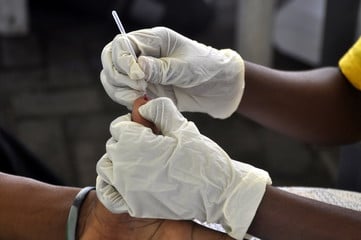There are so many diseases that are affecting the Nigerian population. Let’s find out the common diseases in Nigeria and how to prevent them. [1] [2]
5 Common Diseases in Nigeria and How to Prevent Them

1. Malaria
Malaria is a major health problem in Nigeria and also one of the leading killer diseases in the nation.
Nigeria is said to have the highest burden of this communicable disease in the world. Reports reveal that over 300,000 children die of malaria annually and that it is responsible for nothing less than 25%, 30%, and 11% of infant mortality (children below age 1), childhood mortality (children below age 5), and maternal mortality (pregnant and nursing mothers) respectively.
Pregnant women and children below age five are considered the most susceptible group to this communicable disease, and this is mainly because of their weaker immune system.
That said, reports also reveal that more than 50% of the entire population record at least a case of malaria annually.
Some of the reasons why people die of malaria in Nigeria include self-medication, inadequate awareness, living in an unhealthy environment with no safety measures, inadequate support by the government, usage of substandard, and fake drugs.
Leading Causes
The major cause of malaria is “Anopheles mosquito.”
Once this mosquito is infected with parasites and it bites you, you will become infected too and thus may result in malaria.
How To Prevent Yourself from Malaria in Nigeria
- Spray mosquito repellent on your clothes as well as your naked skin
- Avoid wearing short sleeve shirts and trousers, especially when you are about sleeping. Go for longer clothes instead
- Always sleep under an insecticide-treated mosquito net
- Always keep your doors and windows shot against mosquitoes
- Make sure you keep your surroundings clean always
- Spray your room with a “tested and trusted” insecticide before you sleep
- Use anti-malarial drugs
- Pregnant women and young children should not live near malaria-prone areas
- Pregnant women should opt for Intermittent Preventive Treatment in pregnancy [IPTp]
- Perhaps you become infected, and please AVOID SELF-MEDICATION; contact your doctor immediately.
2. Lower Respiratory Tract Infections
Lower Respiratory Infection or Pneumonia is yet another major and common disease in Nigeria. Millions of Pneumonia cases are recorded all over the country annually, while it also claims thousands of lives every year.
What is Pneumonia?
Pneumonia is a ‘serious’ lung disease that causes the airspaces in the lungs [alveoli] to be inflamed and filled with fluid or pus such that breathing becomes difficult.
Some of the common symptoms of Pneumonia include:
- – Fever
- – Cough (sometimes with mucus)
- – Shortness of breath
- – Fatigue
- – Intense Chest pain
- – Nausea, vomiting or diarrhea
- – Fever, sweating and shaking chills
Leading Causes
Pneumonia can be caused by many germs. However, the leading causes of this disease are bacteria and viruses that are present in the air we inhale.
Although the body always tries to defend the lungs from being infected, the germs can overpower the immune system regardless of how good your health is.
How To Prevent Yourself from Lower Respiratory Tract Infections
Follow the below tips to reduce your risk of getting pneumonia:
- Practice good hygiene habits.
- Avoid smoking.
- Always keep your hand clean and wash with warm water and soap.
- Eat a balanced diet
- Don’t expose your children to people with colds or the flu
- Get enough rest
- Drink enough water to minimize congestion
- Keep your immune system boosted by taking supplements like vitamin C, zinc, etc.
- Get vaccinated against pneumococcal pneumonia at the hospital
- Exercise regularly
3. HIV/AIDS
There’s no way we could highlight common diseases in Nigeria without featuring HIV/AIDS.
Acquired immunodeficiency syndrome (AIDS) is a serious health condition solely caused by the Human Immunodeficiency Virus (HIV).
One of the negative effects of HIV on the human system is that it weakens the immune system, and thus making the patient more vulnerable to a wide range of diseases.
Currently, Nigeria has close to 3 million people living with HIV/AIDS, making it one of the countries with the highest number of the potentially life-threatening condition. The first two countries are India and South Africa, while Nigeria is occupying the 3rd position worldwide.
Apart from the fact that HIV/AIDS has claimed close to 1 million lives in Nigeria, it is also said to be one of the leading causes of maternal death and disability, which should be an issue of concern to the populace as well as the government.
That said, it is worthy to note that HIV/AIDS is one of the diseases that have no cure yet; it can only be managed with the aid of certain drugs and medications.
Some of the symptoms of HIV/AIDS include:
- Sores of the mouth, anus, and genitals
- Fever
- Rash
- Headache
- Fatigue
- Swollen lymph nodes
- Oral yeast infection
- Muscle aches and joint pain
- Diarrhea
- Sudden Weight loss
- Night sweats
Leading Causes
Reported common causes of HIV/AIDS include:
– Unprotected sex with an infected person
– Sharing sharp objects with an infected person
– Receiving blood transfusion from an infected person
– Sucking the breast of an infected person
How To Prevent Yourself from HIV/AIDS
Prevention is better than cure. Prevent yourself against HIV/AIDS by following these tips:
- Always use a [new] condom when having sex
- Avoid sharing sharp objects, especially needles with another person
- Avoid barbing in public shops. If you must do so, make sure the barber is very hygienic and that he keeps his barbing tools clean always
- Avoid taking blood transfusion from an infected person
- Consider male circumcision
- Be very hygienic
- Always update your knowledge about HIV/AIDS and stay safe
4. Diarrheal Diseases

Yes, we’ve highlighted that HIV/AIDS, Pneumonia, and Malaria are the prevalent diseases in Nigeria but do you know that Diarrheal diseases also belong to this category? Of course, that’s the fact!
Diarrhea is a gastrointestinal infection often caused by bacteria and viruses. You can also contract it upon ingesting contaminated food or drinking water.
Some of its common symptoms include:
- Abdominal cramps and pain
- Loose, watery stool
- Abnormal bowel movements
- Nausea
- Fever
- Bloating
- Bloody stool
- Stool with mucus
However, Diarrhea, if left untreated for a while, could lead to other related conditions, including irritable bowel disorder, persistent infection, inflammatory bowel disease, among others.
Having said that, Diarrhea diseases are rated the 4th leading cause of mortality among children below age 5 in Nigeria.
Diarrhea is said to be predominant in Nigeria as a result of many factors, including scarcity of safe water, unkempt environment, inadequate awareness, suboptimal breastfeeding, zinc, and vitamin A deficiency, to mention but a few.
Leading Causes
Common causes of diarrhea include:
- Ingestion of contaminated food or water
- Poor personal, domestic hygiene
- Excess intake of artificial sweeteners
- Lack of adequate breastfeeding
- Medications such as antibiotics, cancer drugs, and antacids
- Lack of access to safe drinking-water supplies
- Poor eating habits
How to Prevent Yourself from Diarrheal Diseases
- Wash your hands regularly
- Avoid eating raw or undercooked meats
- Be very careful about what you eat or drink
- Drink only clean, treated water
- Eat a balanced diet
- Keep your environment clean always
- Be very hygienic
- Nursing mothers should breastfeed their babies adequately
5. Protein Energy Malnutrition (PEM)

Protein-Energy malnutrition (PEM) is another health problem in Nigeria. It is associated with a significant percentage of childhood mortality (children below age 5) in the nation.
More importantly, it is very unfortunate that the current economic condition of Nigeria is not even helping situations in the sense that only a few groups of people can afford the balanced, 3 square meal in the nation.
Leading Causes
- High Unemployment rate
- Poverty
- Illiteracy
- Overcrowding
- Food shortage
How To Prevent Yourself
- Devise multiple sources of income
- Eat a balanced diet
- Always store and preserve your foods adequately
- Engage in communal farming and donate food items to the less privileged
- Eat high-energy therapeutic foods
- Nursing mothers should breastfeed their children adequately
Other Common Disease in Nigeria:
- Tuberculosis
- Meningitis
- ischemic heart disease
- Stroke
- Cirrhosis
- Typhoid. [3]
ALSO READ:
- How to Prevent Typhoid in Nigeria
- 5 Common Mental Health Problems in Nigeria
- 6 Shocking Mental Health Statistics in Nigeria.
Collins Nwokolo is a human physiologist, writer and health enthusiast. He loves writing helpful articles on health and fitness, which he enjoys sharing with everyone.







